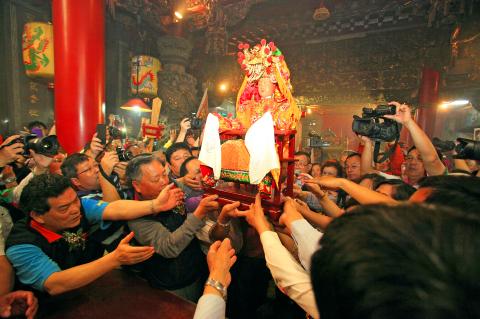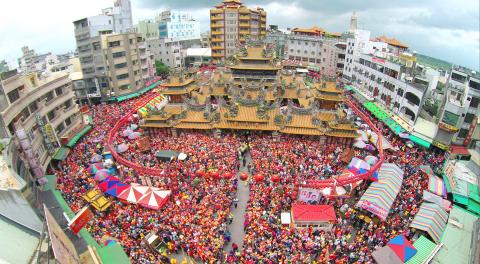On March 16th, on the stroke of half past midnight, a palanquin holding a centuries-old Matsu statue, newly washed and dressed, will leave the Gong Tian Temple (拱天宮) in Baishatun (白沙屯), Miaoli County.
Who chose that date? The goddess did. Why leave at such an ungodly hour? That, too, was Matsu’s decision.
The 11-day pilgrimage will take in a 200km round trip to Chao Tian Temple (朝天宮) in Beigang (北港), Yunlin County, and back. The arrangements, says the temple’s current director, Chen Chun-fa (陳春發), are 70 percent decided by the goddess, 30 percent by the temple committee.

Photo courtesy of the Baishatun Matsu Web site
Chen says the committee wanted an early morning start to let the pilgrims get some sleep, but no matter how many times they cast lots it was “no” for a morning start.
“We always go according to what Matsu wants.”
The Baishatun pilgrimage, the earliest “pedestrian” Matsu pilgrimage in Taiwan, started over 200 years ago, with perhaps 20 pilgrims, Chen says. Today pilgrims come from all over Taiwan, and from Japan. When Chen first attended in 1971, there were some 300 pilgrims. There were no more than 3,000 when he joined the temple 15 years ago.

Photo courtesy of the Baishatun Matsu Web site
“It has increased yearly since then and ballooned in the last few years. Last year 19,000 people registered; 15,000 have already registered for this year’s event.”
Unlike the Dajia (大甲) pilgrimage, the route is unknown.
“Lots of police ask us, but we can only tell them that we simply don’t know,” Chen said.
MATSU’S WHIM
Matsu will tell the bearers her preferred direction whenever they come to junction. In 1978, Matsu decided not to cross the Xiluo Bridge (西螺大橋), and insisted on going underneath, where they chanced upon a family living in a ramshackle hut by the river. The palanquin swayed, lots were cast, and it was discovered Matsu was saying the family should move before the Dragon Boat Festival.
The family moved, heavy rains swelled the river, the shack was swept away.
Neither does the goddess necessarily allot to stay overnight at a temple. Thirty years ago the palanquin stayed at a house in Xiluo. It entered via the front door without problem, but the next morning the owner had to dismantle the doorway to get the palanquin out.
“That year he made a lot of money,” Chen said, referring to the popular notion that if you do Matsu a favor, she will reward you.
For a registration fee of NT$700, pilgrims receive clothes, a hat, a talisman, a mention to Matsu and their name read out by Chao Tian Temple priests before the pilgrimage returns from Beigang. You cannot register online; send money and info including your name and size via registered post, and on the day of the pilgrimage you can pick up your goodies from the temple.
You don’t need to register to participate.
If you fancy attending some or all of the route, it leaves the temple, near Baishatun train station in Miaoli County, at 12:30am on Wednesday, arriving in Beigang on March 20 and arriving back in Baishatun on March 26.
Food and water are provided free along the route. Bring sunscreen, mosquito repellent, talcum powder and consider a tent. Be prepared for huge crowds.
— additional reporting by louis jia-yu wei

It’s a good thing that 2025 is over. Yes, I fully expect we will look back on the year with nostalgia, once we have experienced this year and 2027. Traditionally at New Years much discourse is devoted to discussing what happened the previous year. Let’s have a look at what didn’t happen. Many bad things did not happen. The People’s Republic of China (PRC) did not attack Taiwan. We didn’t have a massive, destructive earthquake or drought. We didn’t have a major human pandemic. No widespread unemployment or other destructive social events. Nothing serious was done about Taiwan’s swelling birth rate catastrophe.

Words of the Year are not just interesting, they are telling. They are language and attitude barometers that measure what a country sees as important. The trending vocabulary around AI last year reveals a stark divergence in what each society notices and responds to the technological shift. For the Anglosphere it’s fatigue. For China it’s ambition. For Taiwan, it’s pragmatic vigilance. In Taiwan’s annual “representative character” vote, “recall” (罷) took the top spot with over 15,000 votes, followed closely by “scam” (詐). While “recall” speaks to the island’s partisan deadlock — a year defined by legislative recall campaigns and a public exhausted

In the 2010s, the Communist Party of China (CCP) began cracking down on Christian churches. Media reports said at the time that various versions of Protestant Christianity were likely the fastest growing religions in the People’s Republic of China (PRC). The crackdown was part of a campaign that in turn was part of a larger movement to bring religion under party control. For the Protestant churches, “the government’s aim has been to force all churches into the state-controlled organization,” according to a 2023 article in Christianity Today. That piece was centered on Wang Yi (王怡), the fiery, charismatic pastor of the

Hsu Pu-liao (許不了) never lived to see the premiere of his most successful film, The Clown and the Swan (小丑與天鵝, 1985). The movie, which starred Hsu, the “Taiwanese Charlie Chaplin,” outgrossed Jackie Chan’s Heart of Dragon (龍的心), earning NT$9.2 million at the local box office. Forty years after its premiere, the film has become the Taiwan Film and Audiovisual Institute’s (TFAI) 100th restoration. “It is the only one of Hsu’s films whose original negative survived,” says director Kevin Chu (朱延平), one of Taiwan’s most commercially successful